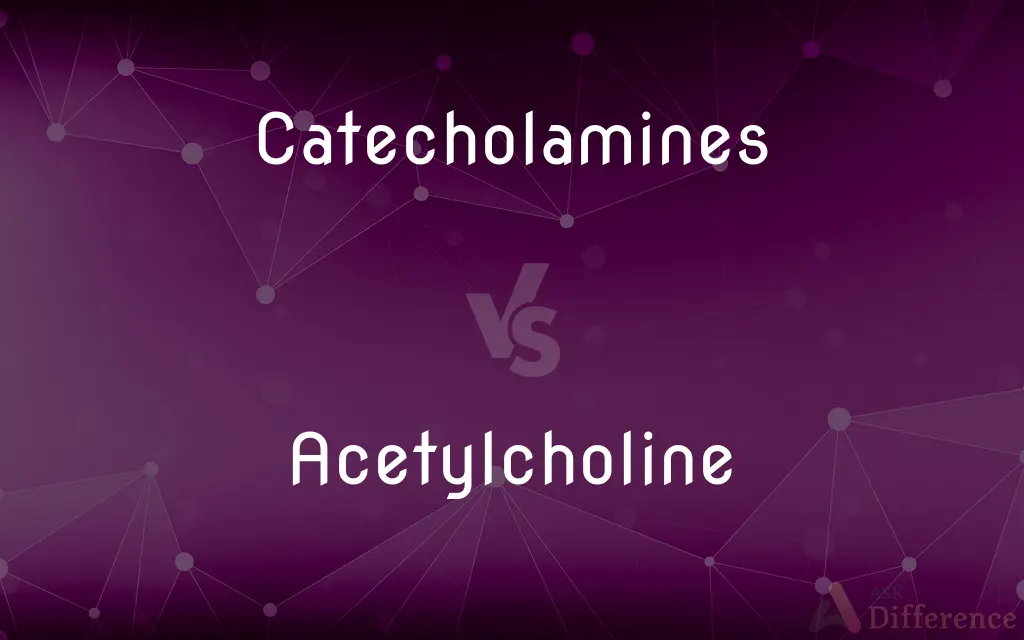Catecholamines vs. Acetylcholine — What's the Difference?
By Tayyaba Rehman — Published on January 5, 2024
Catecholamines are a group of neurotransmitters like dopamine and adrenaline, while acetylcholine is a single neurotransmitter involved in muscle activation and memory.

Difference Between Catecholamines and Acetylcholine
Table of Contents
ADVERTISEMENT
Key Differences
Catecholamines are a group of neurotransmitters that include dopamine, norepinephrine, and epinephrine (adrenaline). They are primarily involved in the body's response to stress or excitement, playing key roles in the fight-or-flight response. Acetylcholine, on the other hand, is a specific neurotransmitter that is crucial for muscle activation, memory, and learning. It functions both in the central and peripheral nervous systems.
In the brain, catecholamines influence mood, attention, and arousal. Dopamine, for instance, is integral to the brain's reward system and is associated with feelings of pleasure and motivation. Acetylcholine is important for cognitive functions, particularly in the formation of memory and learning processes. It is also the primary neurotransmitter at neuromuscular junctions, where it stimulates muscle contractions.
The synthesis of catecholamines involves a series of steps starting from the amino acid tyrosine. These neurotransmitters are produced in the adrenal glands and certain neurons in the brain. Acetylcholine is synthesized from choline and acetyl-CoA. Its production and release are primarily in motor neurons and the brain.
Imbalances or dysfunctions in catecholamines have been linked to various mental health disorders, such as depression and Parkinson's disease. Imbalances in acetylcholine are associated with conditions like Alzheimer's disease, due to its role in cognition and memory, and with myasthenia gravis, a neuromuscular disorder.
In terms of their mechanism of action, catecholamines generally work by binding to and activating adrenergic receptors, which are widespread throughout the body. Acetylcholine acts by binding to cholinergic receptors, which are divided into nicotinic and muscarinic receptors, each having different functions in the nervous system.
ADVERTISEMENT
Comparison Chart
Type
Group of neurotransmitters (dopamine, norepinephrine, epinephrine)
Single neurotransmitter
Primary Functions
Involved in stress response, mood, and attention
Muscle activation, memory, and learning
Synthesis
From tyrosine
From choline and acetyl-CoA
Associated Disorders
Depression, Parkinson's disease
Alzheimer's disease, myasthenia gravis
Receptor Types
Adrenergic receptors
Cholinergic receptors (nicotinic and muscarinic receptors)
Compare with Definitions
Catecholamines
Catecholamines are neurotransmitters involved in the body’s response to stress.
Adrenaline, a catecholamine, increases heart rate during stressful situations.
Acetylcholine
Acetylcholine is a neurotransmitter important for muscle movement and memory.
Acetylcholine is released at neuromuscular junctions to stimulate muscle contractions.
Catecholamines
Include dopamine, norepinephrine, and epinephrine.
Dopamine, a catecholamine, is key in the brain's reward system.
Acetylcholine
Synthesized from choline and acetyl-CoA.
Acetylcholine deficiency is associated with Alzheimer's disease.
Catecholamines
Influence mood, attention, and arousal.
Catecholamines are elevated during excitement or stress.
Acetylcholine
Acts on cholinergic receptors (nicotinic and muscarinic).
Nicotinic receptors respond to acetylcholine in the autonomic nervous system.
Catecholamines
Produced in the adrenal glands and some brain neurons.
Norepinephrine is a catecholamine that helps regulate blood pressure.
Acetylcholine
Functions in both the central and peripheral nervous systems.
In the brain, acetylcholine is involved in cognitive processes.
Catecholamines
Associated with mental health disorders when imbalanced.
Low levels of catecholamines are linked to depression.
Acetylcholine
Linked to neurological disorders when disrupted.
Myasthenia gravis is caused by antibodies blocking acetylcholine receptors.
Catecholamines
Any of a group of monoamines, including epinephrine, norepinephrine, and dopamine, that act as neurotransmitters and hormones.
Acetylcholine
A substance, C7H17NO3, that is derived from choline and is released at the ends of nerve fibers in the somatic and parasympathetic nervous systems, where it mediates the transmission of nerve impulses.
Catecholamines
Plural of catecholamine
Acetylcholine
(neurotransmitter) A neurotransmitter in humans and other animals. It is an ester of acetic acid and choline with chemical formula CH3COOCH2CH2N+(CH3)3.
Acetylcholine
A neurotransmitter released by the transmitting dendron at autononmous synapses and at neuromuscular junctions. It is a quaternary amine with an obligatory negative counterion. The nominal formula for the hydroxide form is C7H17NO3. Structural formula (CH3)3N(+)CH2CH2.O.CO.CH3.OH(-).
Acetylcholine
A neurotransmitter that is a derivative of choline; released at the ends of nerve fibers in the somatic and parasympathetic nervous systems
Common Curiosities
Where are catecholamines produced?
In the adrenal glands and certain neurons in the brain.
What is acetylcholine?
A neurotransmitter crucial for muscle movement, memory, and learning.
What receptors do catecholamines act on?
They act on adrenergic receptors throughout the body.
How do catecholamines affect mood?
They influence mood by regulating attention, arousal, and the brain’s reward system.
What disorders are associated with catecholamines?
Imbalances can lead to depression, Parkinson’s disease, and other mental health issues.
What disorders are linked to acetylcholine?
Alzheimer's disease and myasthenia gravis, among others.
What are catecholamines?
They are a group of neurotransmitters that include dopamine, norepinephrine, and epinephrine.
Can catecholamine levels be measured?
Yes, through blood and urine tests.
What role does acetylcholine play in the body?
It is key in activating muscles and in cognitive functions like memory formation.
What are the types of receptors for acetylcholine?
Cholinergic receptors, which include nicotinic and muscarinic receptors.
How does acetylcholine affect muscle contractions?
It binds to receptors on muscle cells, triggering contraction.
How is acetylcholine synthesized?
From choline and acetyl-CoA.
What is the role of acetylcholine in the nervous system?
It transmits nerve signals to muscles and is involved in brain functions.
How do catecholamines respond to stress?
They increase heart rate, blood pressure, and energy levels during stress.
Are catecholamines and acetylcholine used in treatments?
Yes, in various forms, for treating conditions like heart problems and neurological disorders.
Share Your Discovery

Previous Comparison
Organic Acid vs. Inorganic Acid
Next Comparison
Sugar in the DNA vs. Sugar in the RNAAuthor Spotlight
Written by
Tayyaba RehmanTayyaba Rehman is a distinguished writer, currently serving as a primary contributor to askdifference.com. As a researcher in semantics and etymology, Tayyaba's passion for the complexity of languages and their distinctions has found a perfect home on the platform. Tayyaba delves into the intricacies of language, distinguishing between commonly confused words and phrases, thereby providing clarity for readers worldwide.
















































